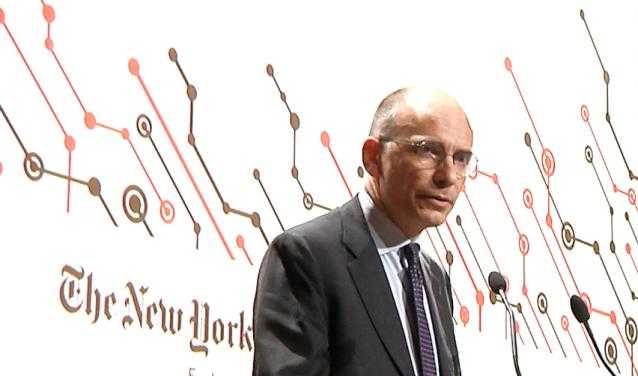Home>Innovation or Chaos? Technology Reconsidered

23.01.2019
Innovation or Chaos? Technology Reconsidered
On 21st January, Sciences Po students shared the stage with leading international figures to debate the effects of the technological revolution in the 2019 Kofi Annan edition of the Youth and Leaders Summit. Organised each year by Sciences Po’s School of International Affairs (PSIA), this year’s summit was held in memory of the late Kofi Annan, who visited the university in 2015.
This year the debate focused on how technology impacts world peace and security. Amongst this year’s speakers were members of the UN, European Commissioners, leading journalists, academics, international think tanks, and research centres.
The Debate Gets Underway
Following the opening address from Frédéric Mion, President of Sciences Po, Elder Lakhdar Brahimi paid a warm tribute to Kofi Annan. The subject focus of the summit, technology, was then introduced by Gro Harlem Brundtland, Elder and former Prime Minister of Norway, with particular focus on its links with combating climate change.
The first panel evaluated the ways in which technology poses challenges for world security. On this matter, Maria Chiara Carrozza, Professor of BioRobotics at the Sant’Anna School of Advanced Studies in Pisa, Italy, illustrated how bio-robotics could improve our lives, but added that robots may increase societal inequality and reduce security. Both Dan Smith, Director of the Stockholm International Peace Research Institute, and Carlos Lopes, former Executive Secretary of the UN Economic Commission for Africa, agreed that tackling climate change is of paramount importance. Mr Smith stated that "green technology is absolutely everything [...] slowing down climate change is the biggest security challenge we face." Additionally, Mr Lopes emphasised the significance of developing African nations like the Democratic Republic of Congo in our plight to end dependence on fossil fuels. In an ageing society, the estimated average age of Africans in 50 years time is set to be 18. We must help these nations to establish themselves at the forefront of technological innovation. Houda-Imane Faraoun later reinforced the need to stimulate African technological advances. She found that "we must manufacture in the same place that we are extracting materials."
Following this Margrethe Vestager, European Commissioner for Competition, shed light on the problems businesses face in the digital sphere. She highlighted the need to "encourage the young generation to engage and take responsibility" for competition policy. Her discussion investigated the shadow cast by the big tech companies, and how we can construct a fair and competitive market for all businesses. Fair competition, where data is concerned, is her mission. As after all "the market is here to serve us as consumers."
Technology Can Build a Better World
Then Lakhdar Brahimi led discussion with Sir Richard Branson, the Founder of the Virgin Group, by means of a live video conference.
Talking about the role of entrepreneurs in society, Branson found that entrepreneurs hold great advantages over politicians as "they don’t have to worry about being popular [...] they see problems differently than perhaps the government, or perhaps even the social sector. They should use their entrepreneurial skills to get out and sort out the problems of the world."
In contrast to comments made in earlier panels, Branson saw technology as a force for good. Space exploration, he suggested, could benefit us by using satellites to monitor and stop illegal fishing, thus protecting our oceans. He also demonstrated how technology is already making a difference. For example he is involved in a pioneering scheme which gives isolated villages in Africa and Asia, without access to a doctor, the skills to use an iPad to enable them to provide medical advice to their own communities.
Finally, Branson evaluated the impacts of Brexit for business, stating that it was the "single worst thing that has happened to the country". Insightful questions by the PSIA students prompted discussion on the compatibility of extreme left wing politics with entrepreneurship and taxation of big business. Branson was firmly in favour of fair taxation and entrepreneurship, and against the nationalisation of industries in Britain under a potential Corbyn government.
The concluding panel debated governance and ethics in the digital age. Annika Silva-Leander, Head of Democracy Assessment and Political Analysis, International IDEA, suggested that social media provides a forum for "generating debate but also taking a stance [...] [and] voting on specific issues." Closing remarks were given by Enrico Letta, the Dean of PSIA and former Italian Prime Minister. According to him, the future rests firmly in the hands of today’s students, and it is up to them "to use technologies for good."
Related links